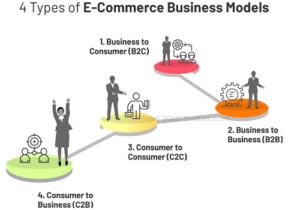
4 Types of E-Commerce Business Models
- Business to Consumer (B2C): In the B2C business model, the business sells its offerings directly to end-users. Online retailers base their business on the B2C model.
- Business to Business (B2B): A business provides its offerings to other businesses in the B2B business model. Organizations that offer B2B SaaS (Software as a Service) products or sell products in bulk follow the B2B model.
- Consumer to Consumer (C2C): In this model, the transaction takes place between two customers. A user selling their pre-owned goods to other consumers is an example of the C2C model.
- Consumer to Business (C2B): C2B e-commerce takes place when a consumer offers value to a business. Online portals that provide freelance services is an example of the C2B business model




